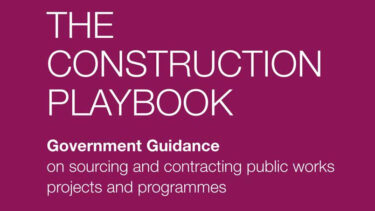Public sector procurement has never been able to stand still. It is in a continued state of evolution in its quest to improve quality and efficiency, conscious of its over-riding responsibility to provide tax-payers with value for money.
However, the combined challenges of financial sustainability, climate change and more recently the COVID-19 pandemic has shone a fresh light on its processes, and both reinforced as well as accelerated the need to ensure that procurement is fit for whatever future may be ahead of us.

Steve Beechey
Public Sector Director
Part of this process has been the recent publication of the Construction Playbook, an 83-page blueprint for delivering public sector works, setting out clear requirements that the Government believes will drive the necessary reforms in the construction industry. As a business with a public sector portfolio of more than £1.2 billion we were delighted to be invited to play our part in the consultation process for this initiative. After much collaboration and input from across our sector, the end result is a really comprehensive framework that identifies areas that the Government needs to fix, and where the industry itself can do more.
A journey of improvement
The Construction Playbook isn’t the start of a revolution. The challenges that the industry has faced in recent years both perceived and real have long been understood by those within construction.
Huge amounts of work have already happened and continue to happen to improve its processes. Not least as the industry has had to face the challenges of the coronavirus and the impressive way the industry has responded to the government’s call to continue working during the pandemic.
Wates is a delivery partner to around 80 per cent of the UK’s leading central and local government frameworks including SCAPE, the DfE, CCS and numerous others. What is incredibly reassuring is that when you review the 14 policy areas and recommendations in the Playbook, there is much that is being done already by these organisations. Indeed, in many ways frameworks like SCAPE can be used as Playbook role models for the procurement of public works.
While the Construction Playbook is not about driving a revolution, there is no doubt that achieving a consistent approach across the whole process would be transformational – and as good as any of the frameworks are, there will always be areas that can be improved.
Leaving no stone unturned
Creating a process that is as efficient as possible, delivered by a financially stable industry and continuing to deliver the best outcomes for both taxpayers and communities is at the heart of the 14 policy areas examined in the Playbook, each of which will play an important part in continuing to move the industry forward.
For example, a recommendation that complex projects must produce a ‘should cost’ model as part of assessment using past project data is a significant moment in the industry’s drive to support the net zero carbon agenda.
Looking at life cycle costs rather than just the capital build costs when assessing a project is a fundamental part of understanding and mitigating carbon in the built environment and is very much aligned with the Playbook’s other recommendations around embedding digital technologies and driving forward a standard approach to BIM.
Another area that is incredibly important to developing a more efficient and ultimately more sustainable industry is around early supply chain collaboration, ensuring contractors involved early in the design process can have a very significant impact and help achieve value for money.
It is hard to overstate how important this is to productivity and the long-term success of a project too often and design can be a year down the line before a contractor is engaged and the first question asked is ‘why did you design it like that?’
The Playbook reinforces the importance of creating real social value, a theme that is already a key driver for SCAPE and other frameworks, and there are also a series of important recommendations around risk allocation, fair payment, financial assessment and the monitoring of contractors and supply chain to make disasters like the Carillion collapse less likely in the future.

THE CONSTRUCTION PLAYBOOK
Helping to set a new benchmark
It is reassuring that many of the recommendations are already standard practice in the best frameworks. But the Construction Playbook will provide the guiding principles and encouragement to ensure everybody’s aims are as high as possible.
The Playbook brings together various strands into a coherent single point of reference. While its recommendations are not mandated in law, there will be a major incentive to embrace and embed its recommendations for those companies that want to work in the public sector, which in turn will raise standards across the industry.
The construction industry is always looking to move forwards and the Playbook should a help it move just a bit faster.






